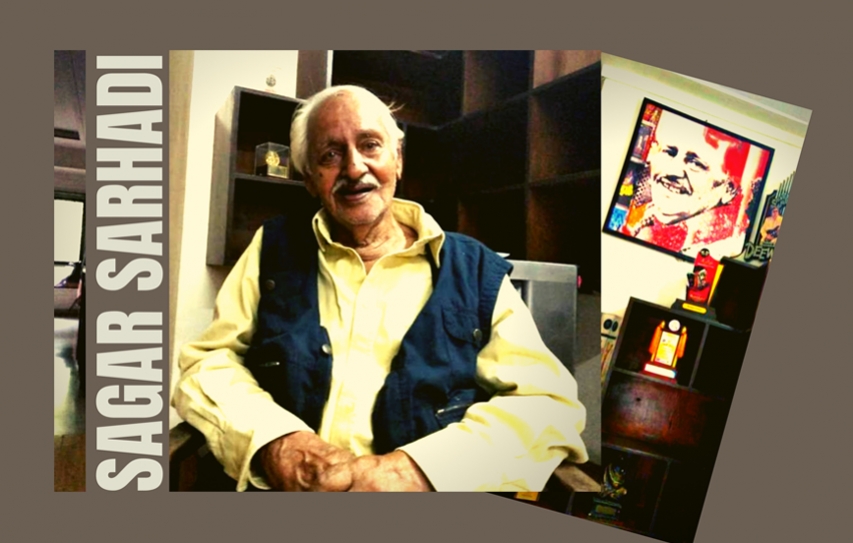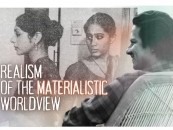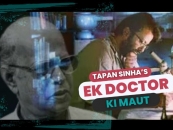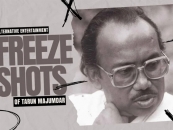
Bazaar 2 In The Works: Sagar Sarhadi
by Khalid Mohamed August 3 2020, 11:57 am Estimated Reading Time: 8 mins, 37 secsKhalid Mohamed catches up with the eminent short story writer, film dialogue wordsmith and director Sagar Sarhadi
At a book-lined Juhu apartment, a no-agenda soiree would be on. Whisky, beer and rum flowed, the air was thick with debates on politics shifting gears to poetry, literature and cinema. Sagar Sarhadi - writer and director - would be the casual unfussy host, laughing at the corniest jokes cracked by the guests and milling around to ensure that no one’s glass of the preferred drink, soda and ice was empty.
I cherished those days as days of learning the precepts of Marxism, of Urdu verses recited on-key but an anxiety always persisted; when would our host’s second directorial venture Tere Shaher Mein, featuring Smita Patil and Naseeruddin Shah reach the cinema halls?
Bazaar, had already established him as a socially concerned filmmaker since he had exposed the evil of buying nubile brides in Hyderabad, young women who would be coerced into a nikaah with older men, only to be sexually abused and discarded as rags.
As much to the point, Sarhadi had already written for Yash Chopra’s Kabhi Kabhie, Noorie, Chandni, Sislila and Faasle. And, he had also made his mark as a dialogue ace with Basu Bhattacharya’s black-and-white film Anubhav, focusing on a self-absorbed but well-meaning newspaper editor (Sanjeev Kumar) and his neglected wife (Tanuja). He had also written short stories and stage plays (performed by IPTA mostly).
In my saucer-round eyes he was boss, a redeeming departure from the showy, publicity-hungry film personalities of every stripe.
At the soiree there would be his nephew, filmmaker Ramesh Talwar, actress Rekha Rao whose light eyes would light up the room, my friends city historian Rafique Bagdadi and film critic Rashid Irani and strangers who would drift in and out from the open-house. It was my first and last acquaintance with a salon of creative persons who never bragged but engaged in conversations, which could be argumentative and yet edifying.

So much for the backstory of the abidingly generous and intelligent spirit of Sagar Sarhadi - born Ganga Sagar Talwar in Bafa, close to Abbotabad (now in west Pakistan). As a teenager, he had sought to find employment as a taxi driver, a typing instructor and a cloth shop’s salesman and more, in vain.
Bad weather was back again when the Bazaar director had to give up his Juhu apartment and move back to a tenement in Sion Koliwada. This was partly because of the debts incurred by Lorie, a film with Shabana Azmi, Naseeeruddin Shah and Farouque Shaikh, which he had produced.
And partly because he had to pay off the financier of Tere Shaher Mein - a critique on the judiciary system - since there was a face-off between its financier and its producer S. S. Broca.
After that setback, for years the writer of Yash Chopra’s blockbusters would be seen bicycling his way through the lanes. Although he did go on to work on the dialogue of Kaho Naa Pyaar…Hai, he couldn’t exactly be rock-solid secure again. No Juhu abode, no car, no more soirees. Admittedly, the scheme of things being what they are, I lost touch with him but for occasional salaams-duas exchanged at an IPTA stage performance or a film festival screening.
Now it was by sheer happenstance that I bumped into him around February this year at a barely-furnished Oshiwara office room, where he was settling down for a script discussion with a couple of enthusiastic assistants.
And, the upbeat news was that he was working on the screenplay of Bazaar 2, 38 years after his foray into the original. Sarhadi saab, at 87, is still spry and has preserved his booming laughter. Not to forget that habit of embracing you in his arms in the midst of which he recites an Urdu couplet by Ghalib at such a rapid speed that all I could absorb is; he’s thrilled to see me and his eyes couldn’t stop the tears. They couldn’t, as he turned his face away, regained his composure and chortled, “Saala, what brings you here after so many years? Aren’t you ashamed that it’s taken you so long?”
Ashamed I was, because it was an unpardonable lapse borne out of… what else can I say? The distances in the traffic clogged city and yes, more guiltily, out of sheer absent-mindedness. “Shame on you,” he guffawed. “Now come, come, have some lunch with us.”
Since there was another appointment to keep in the same office enclave, I pleaded to be excused but please, please may I call and chat sometime? “Yeah, go baba go, you have work to do. Meet up whenever you can.”

Needless to lament, the pandemic has prevented that. A phoner parlez-nous, with the help of Sarhadi saab’s assistant Ravi Prakash Pillai, was the only viable option.
Vis-à-vis Bazaar 2 fructifying, the stalwart writer-director states, “I am absolutely sure it will happen. The story has been ideated, locked and I’ve written the outline of the screenplay. It will be directed by Ravi Sharma (earlier he helmed the Amitabh Bachchan starrer Hum Kaun Hain and Jackie Shroff’s Mulaqat). Ravi’s films may not have worked commercially but I have full faith in him. He’s sincere and motivated. I hope to make the script as romantic as possible, a love story weaved into the ongoing evil of the sale of young brides in Hyderabad. We’re just waiting for the lockdown to ease so we can travel there for a recce.”
He points out that, as a young dreamer, he didn’t ever wish to gravitate towards the film domain. Urdu short stories and stage plays were his forte. Among his literary output, he mentions Jiv Janavar - a collection of 17 short stories - as his most accomplished. And of his repertoire of plays, he selects Bhagat Singh ki Vaapsi, Bhuke Bhajan Gopala and Messiah.
On joining the film society movement, however, he was exposed to world cinema, and realised that he needn’t keep a distance from the medium.
After watching one of his plays, Yash Chopra asked Ramesh Talwar if Sarhadi would be interested in writing dialogue for Kabhi Kabhie and that was it. The writer was in Mysore and travelled to Ooty and then Kashmir for prolonged discussions. They would have their creative differences but it’s always debate and consensus, which crystallise into a superior thought, he avers. On submitting the bill for his first script to Yash Chopra, the latter had jested, “Do you write on the basis of kilometres you have travelled?”
The Chopra-Sarhadi collaboration was one of a kind, deeply romantic narratives at a juncture during the 1970s, when the angry young man was firing bullets into the audience’s mind. “Yashji treated me like family,” Sarhadi recalls. “His death seven years ago totally uprooted me. He was a great boss, he would never change anything in the script - not even a comma or a full stop - before asking for my permission. I wonder if they make filmmakers like him any more.”
There were plans to adapt Sarhadi saab’s play Tanhaiyyan into a film toplining Raakhee, but plans went awry. So Bazaar it was, which I can say as a reviewer of those times, was one of the ground-breaking films to present Muslim characters as real and ‘normal’, without ever caricaturing them.

Lucklessly his next with Smita Patil again, Tere Shaher Mein, is still languishing somewhere in the cans but nothing can be done since the rights are with the producer Broca. Un-stymied, Sarhadi saab directed Chausar, with Nawazuddin Siddiqui as the lead, long before the actor had become a recognisable factor. “Yes, there are good chances that it will be sold to a streaming channel soon,” its creator exults. “Der ho sakti hai lekin andher nahin (there may be a delay but not total darkness).”
Cool. He’s sounding peppy and so I toss in a smarmy question. He used to be surrounded by an ever-increasing number of women at those soirees. Did the question of marriage ever cross his mind? Maintaining a straight voice, he responds, “Oh, I have had beautiful relationships with nine to 10 women in my life. None of them ever brought up the topic of marriage. Neither did I.”
Is he scared of mortality? “No, not all,” he laughs. “The coronavirus, the lockdown and the tension everywhere does make me feel suffocated at times… but then I tell myself, count your blessings. So many workers have lost their jobs and they’re becoming poorer. It’s a tragic situation. We all have to go some day, as they say. Right now, my mind and body are in working order. And believe me, I hope to write till my last breath.”
Last question. He hasn’t used a single expletive in the course of our conversation. And there was a time when cuss words flowed from him non-stop? To that he lightens up, “Aah but whenever I did use bad words, it was never with malintent. In fact, some people would say they sound poetic coming from me! Imagine that. I haven’t used them because we’re talking on the phone. Next time we meet, I’ll treat you to them. Saala pagla hai tu (You’re crazy). You haven’t changed. And neither have I.”
And, as we end the phone call, the Ghalib couplet returns, “Muddat ke baad usne jo ki lutf ki nigaah dil toh khush ho gaya… Magar aansoo nikal pade. (After an eternity when the gaze was directed towards me… my heart leapt up with joy… But I couldn’t control the tears.”






-173X130.jpg)




